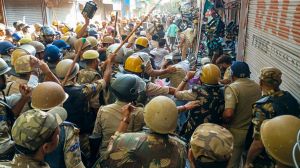Navy too played a crucial role in Kargil operations
KOCHI, JULY 30: True to the Indian naval traditions, the country's naval wing also played a significant role in the Kargil crisis, in clo...

KOCHI, JULY 30: True to the Indian naval traditions, the country’s naval wing also played a significant role in the Kargil crisis, in close co-ordination with the Army and Air Force, according to Admiral Sushil Kumar, the Chief of Naval Staff.
In the first official press briefing by him after the Kargil operations, the naval chief said here today that though not yet much publisized, the Indian Navy’s assertive posture in the north-western sector of the Arabian Sea closing in on the Karachi port right on time had its own supportive effect on the joint operations of the country’s three forces in Kargil and the early end to the crisis.
Sushil Kumar said starting from just taking precautionary measures ever since the armed intrusion into Kargil was known, the Indian Navy succeeded in sending continuous and clear warning signals to the opponent that India was more than prepared to face any eventualities at the sea and could at any moment even chop off Pakistan’s lifeline itself by effecting a blocakade of theKarachi port which he described as the `soft underbelly’ of the opponent.
Sushil Kukar said as it became clearly evident that it was nothing but a well-planned armed intrusion by Pakistan in Kargil, the Indian Navy wasted no time in deploying its force including its strike force ready for action in the north-western sector of the Arabian Sea close enough to the Karachi port so as to prevent a possible misadventure at the sea by the opponent.
He said the Eastern Naval Fleet which was on a routine exercise at the Bay of Bengal was asked to join the Western Command in the emergency operation adding that the purpose was primarily to show the opponent that India was well prepared and caution Pakistan not to attempt anything at sea.
The admiral said in case there arose an actual war situation the Indian Navy was fully competent and well prepared for the same with a definite edge over the Pakistan Navy. “We could have easily organised a blocakde of the entire north-western sea coast crippling the Karachiport, the only major port of the opponent and on which its entire international trade and supply of oil are dependent,” he added.





- 01
- 02
- 03
- 04
- 05


























